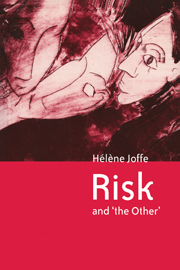Book contents
- Frontmatter
- Contents
- Preface
- Acknowledgements
- 1 Responses to risks: an introduction
- 2 Human responses to risks: ‘not me’, ‘the other is to blame’
- 3 A study of lay people's responses to a risk: HIV/AIDS in Britain and South Africa
- 4 Evaluating two social psychological models of the response to risks
- 5 The source of linking risk and ‘the other’: splitting objects into ‘good’ and ‘bad’
- 6 Social representations of risks
- 7 Emotional life: a new frontier for social theory
- 8 Changing social representations of risks
- References
- Index
5 - The source of linking risk and ‘the other’: splitting objects into ‘good’ and ‘bad’
Published online by Cambridge University Press: 22 September 2009
- Frontmatter
- Contents
- Preface
- Acknowledgements
- 1 Responses to risks: an introduction
- 2 Human responses to risks: ‘not me’, ‘the other is to blame’
- 3 A study of lay people's responses to a risk: HIV/AIDS in Britain and South Africa
- 4 Evaluating two social psychological models of the response to risks
- 5 The source of linking risk and ‘the other’: splitting objects into ‘good’ and ‘bad’
- 6 Social representations of risks
- 7 Emotional life: a new frontier for social theory
- 8 Changing social representations of risks
- References
- Index
Summary
Having presented evidence for the existence of the ‘not me – others are to blame’ response across a range of disasters in various cultures, this is the first of the two chapters that set out my framework for understanding blaming responses with regard to potential crises. It draws on psycho-dynamic, social psychological and socio-cultural theories, assessing their compatibility. Anxiety and the response to it are its organising concepts.
Splitting: the origin of the ‘not me – others’ phenomenon
The origin of the attempt to protect the identity of the self by linking threatening events with ‘the other’ has been carefully explored by psycho-dynamic theorists. With notable exceptions, their focus has not been on responses to mass risks but their theories are well suited to this area. In particular, I utilise the work of the British object relations theorist Melanie Klein in conjunction with certain Freudian tenets to understand the source of the ‘not me – others’ phenomenon.
Melanie Klein's work on people's earliest mental operations provides considerable insight into adult responses to threat. A composite portrait of the Kleinian view of the infant's experience will be charted, high-lighting those aspects which play a part in shaping responses to potential crises in later life. The primary focus is on the unconscious defence termed ‘splitting’ which is an essential aspect of a theory of the representation of threat. Splitting is a way of viewing the world in simplistic terms by seeing it as either black or white.
Information
- Type
- Chapter
- Information
- Risk and 'The Other' , pp. 73 - 89Publisher: Cambridge University PressPrint publication year: 1999
